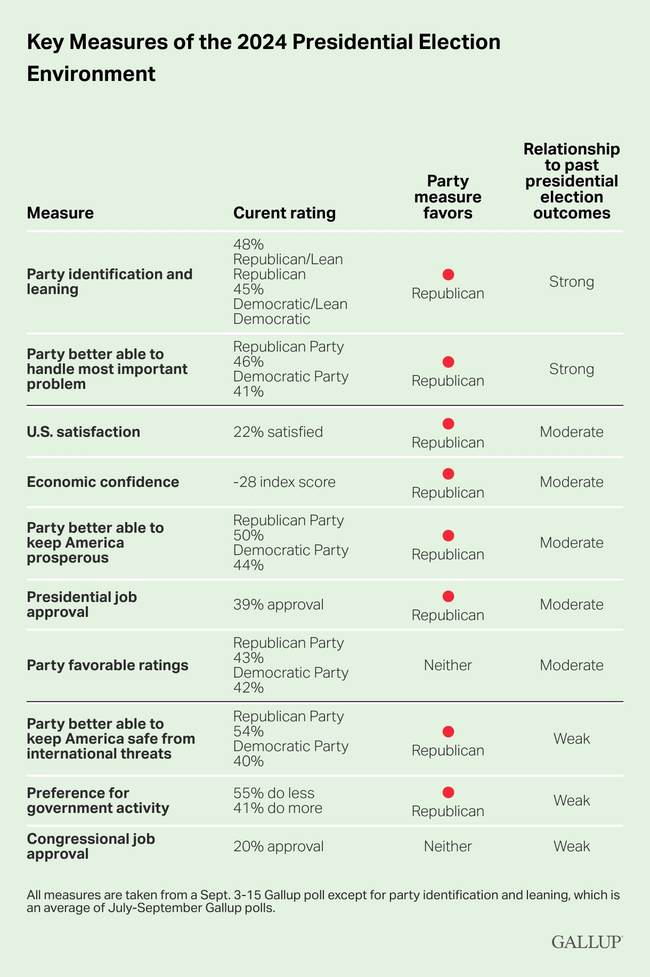


I haven't been covering the polls because a lot of them favor Kamala. Not all of them. There's not a clear advantage, really.
But this Gallup polling is interesting.
Gallup finds that its proxies for voter intention -- stuff like party identification, or answers to questions like "which party is better able to handle the most important issues?" -- all point to a Republican win (or, in a few cases, show no advantage for either party).
Nearly all Gallup measures that have shown some relationship to past presidential election outcomes or that speak to current perceptions of the two major parties favor the Republican Party over the Democratic Party. Chief among these are Republican advantages in U.S. adults' party identification and leanings, the belief that the GOP rather than the Democratic Party is better able to handle the most important problem facing the country, Americans' dissatisfaction with the state of the nation, and negative evaluations of the economy with a Democratic administration in office.
The following is a review of these key measures in 2024, primarily from a Sept. 3-15 Gallup poll, compared with the same measures in past presidential election years.
Here's the big one: Which party do you identify with?
Right now, we're in one of those rare situations where more people say they're Republican than Democrat.
More U.S. adults identify as Republican or say they lean toward the Republican Party (48%) than identify as or lean Democratic (45%). Those figures are based on an average of Gallup polls taken during the third quarter (July to September) to minimize poll-to-poll variation in party identification estimates and to provide more reliable comparisons across presidential years given the different timings of the two major party conventions in July, August or September.
Party affiliation and voting are strongly predictive of individuals' vote choices, with the vast majority of identifiers and leaners voting for the candidate of their preferred party. At the aggregate level, there are typically more Democrats and Democratic leaners than Republicans and Republican leaners in the U.S. adult population. Democrats have won presidential elections in years in which they had larger-than-normal advantages in party affiliation, including 1992, 1996, 2008, 2012 and 2020.
In years when the advantage was narrower -- 2004 and 2016, for example -- Republicans won in the electoral college if not also the popular vote.
Republicans previously have not had an outright advantage in party affiliation during the third quarter of a presidential election year, and they have rarely outnumbered Democrats in election and nonelection years over the past three decades.
Three separate measures of party performance on issues favor the Republican Party by at least a modest margin.
By 46% to 41%, Americans say the Republican Party is better able than the Democratic Party to address what they think is the most important problem facing the country. The top issues Americans currently name as the most important are ones that tend to favor the GOP, including the economy (24%), immigration (22%), the government (17%) and inflation (15%).
This measure has been highly predictive of election outcomes in Gallup trends dating back to 1948. The party rated as better at handling the most important problem has won all but three presidential elections since that year. The question was not asked in 2000, and the two parties tied in 1980, when inflation was the top issue. The only time the measure was out of sync with the outcome was in 1948, when Americans believed the Republican Party was better able to handle the most important problem (international issues) but returned Democratic incumbent Harry Truman to office.
Gallup also tracks perceptions of which party can best handle economic and international matters, broadly. Americans currently give the Republican Party a six-percentage-point edge, 50% to 44%, as the party they think would do a better job of keeping the country prosperous. Gallup has asked this question since 1951. In 16 presidential elections since then when one party has had at least a minimal advantage on this measure, that party has won 12 times. The exceptions were 1952, 1968, 1980 and 2000. The question was not asked in 2004, and the parties were tied in 1956.
Republicans hold a more substantial advantage of 14 points (54% to 40%) as the party Americans believe is better able to keep the nation safe from terrorism and other international threats. Republicans have led on this question all years it has been asked (dating back to 2002) except 2007 and 2012.
Gallup has a limited history of asking this question in presidential election years. The 14-point Republican lead this year is larger than in any previous presidential election year. The prior highs were seven points in 2008 (a year Republicans lost) and 2016 (a year Republicans won). In 2012 (when the parties were tied) and 2020 (when Republicans had a four-point advantage), the Democratic candidate won the presidential election.
Read the full article for more. The below chart shows that the most strongly predictive and even the moderately predictive measures favor Republicans, and Democrats only manage to tie on a few less-important metrics.
And it gets worse: Consumer confidence just plunged the most in three years.
Axios (Politico4Kidz):
The big picture: The Conference Board's Consumer Confidence Index fell almost 7 points to 98.7 in September -- the biggest monthly drop since September 2021.
Why it matters: It's not just monetary policy officials who are worried about a labor market slowdown. Consumers became more pessimistic about the economy this month than in years past -- largely because of a darkening outlook on employment.
Advertisement
What they're saying: The deterioration "likely reflected consumers' concerns about the labor market and reactions to fewer hours, slower payroll increases, fewer job openings," Dana Peterson, the group's chief economist, said in a release.
Best economy since nineteen aughty-aught, fat.
